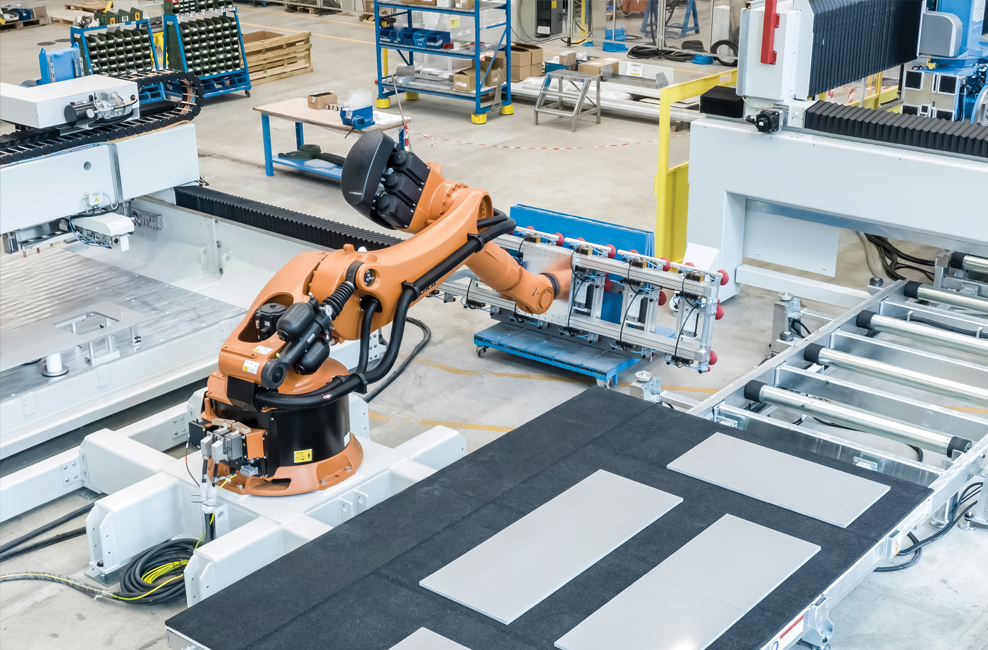Is the stone industry’s biggest battle about to end?
There is no denying that Australia is in a labour crisis. Everywhere you look, businesses are desperately seeking staff, and going to great lengths to get them. Some manufacturers are making a strategic move out to rural areas, where labour is readily available, infrastructure is easier to navigate, and a more laid-back lifestyle awaits. Others are staying put and hoping to get solutions in place, quick smart.
The stone industry is no exception. Stonemasons – if you can get a hold of them – are asking for anything from $49 per hour to a whopping $80 per hour. With the rising cost of raw materials, disruptions in the global supply chain, and a whole host of challenges posed by COVID restrictions, that is just not feasible for most manufacturers to pay.
“The Stone industry is extremely challenging for a number of reasons. It is a very traditional industry and the environment where the stone is manufactured, in a lot of cases, is not very clean – often wet or dusty. The material itself is very heavy, requiring skill and equipment to handle. Then when you factor in COVID restrictions, demand on labour has really been affected. Stonemasons in the industry, in every state, are looking for astronomical wages. That is, if you can even get them.” says Pierre Sullivan, Managing Director of machinery supply firm Innovync.
Nation-wide, the situation is so bad that State Governments have taken to implementing immigration programs in order to lure workers in. Occupations like Metal Workers and Machinists, Construction and Carpenters rank in the top fifteen of Australia’s Skilled Labour Migration list, along with Programmers and other technical professions. But Australia already has a large number of highly skilled stone professionals who could do the work. They are just not being encouraged to.
“There are a lot of highly skilled people in Australia that are at retirement age, but if they work just one day a week, their pension gets cut by 50%. They say, well why should I work then? That is the problem. The younger workers can get plenty of training at TAFE colleges. But no young worker wants to work in dusty environments, where they can get silicosis and cancer and other nasty things. They want to work where there are high-tech machines in place, where the environment is clean and the right safety measures are implemented,” says Dennis Horne, Melbourne-based Director of Equipment Finance & Leasing.
Rather than seeking out retired staff or waiting for cheap labour to arrive from overseas, factories are putting more strain on their existing workforce. The pent-up orders caused by last year’s restrictions are still being processed; and recent floods in Queensland and New South Wales have only caused greater demand for stone cutting services. The band-aid solution?
“People are paying overtime, and once you start to pay overtime, you lose money. That is why people are stopping the hiring of staff and choosing to invest in machinery. It makes a lot of sense. For every $10,000 a month you spend on overtime or wages, you could borrow $500,000 and invest in machinery. Specialist finance brokers like myself go to banks and ask for the money on your behalf, then help you put it toward investing in equipment,” says Dennis.
Despite desperately needing cleaner, safer technology, Australia’s Stone industry is one of the last to adopt automated machinery. According to Dennis, resistance stems from a number of things; including the perception that debt means failure, and the mismanagement of money – whether it is stacks of cash that cannot easily be counted or badly kept balance sheets. And then there are the non-financial objections.
Some of these include having to train operators who might eventually be poached by other firms, the expense of the equipment itself, and the lack of local service and support. All valid issues in the industry. Yet, there are plenty of success stories that prove that smart investments pay dividends.
Take Pacific Stone, for example. With a large fleet of locally supported CNC machines and well-cared-for staff running them, Daniel Zovko and his team are constantly growing operations. Their CMS Brembana models work away with minimal staff on hand – a factor that has helped them ride out the impact of COVID restrictions, while cutting costs down to a minimum.
“Because we have two machines, we have what we call a cutting cell, so we have two machines but one operator. Our labour costs are essentially halved,” says Daniel. Pacific Stone’s Director.
The CMS Brembana Smartline and Speed TR were recent acquisitions, installed during 2020 and 2021, respectively. Like all CMS Brembana models, they are optimised to process stone as efficiently as possible, with high-quality results to boast. The Speed TR has even been customised with three expanded tool racks under the bridge to cut down on back-and-forth movement across the table, while also lowering tool change time. If anything should happen to slow them down, CMS’ dedicated local distributor, Innovync, is there to resolve any issues.
With COVID regulations affecting factories, plus rising inflation predicted in the near future, it is hard to argue against the benefits of automated machinery in the current market – even in an industry that has largely resisted it. The only question is: how long will Australian Stonemasons afford to deny the advantages that advanced technology brings?
Article by Tijana Trifunovich

